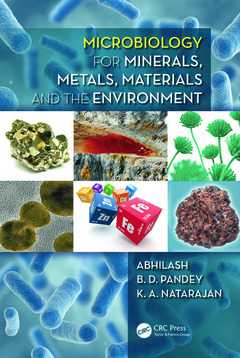Microbiology for Minerals, Metals, Materials and the Environment
Coordonnateurs : Abhilash , Pandey B. D., Natarajan K. A.

Microbiology for Minerals, Metals, Materials and the Environment links chemical, metallurgical, and other metal inherent systems with microbes, and analyzes the interdependence between them. Specifically intended to underscore the importance of microbes in environmental remediation in the mining industries, this text offers a basic and conceptual understanding of the role of microbes, and provides an extensive exploration of microbiology and metals. Each chapter is written by experts from research, industry and academia. The authors expand on the whole scale of microbiology applications relevant to minerals, metal, material, and environment. They elicit the applications of microbes for metal extraction (including mechanisms and methods) from primary ores/minerals and mining wastes, biomining and related concepts of microbial diversity and various operations, and molecular biology of microbes involved in such systems (extremophiles). They also address in detail biohydrometallurgy, biomineralisation, bioleaching, biobeneficiation, biosynthesis, and bioremediation and other related areas.
This book:
- Includes bacterial leaching, hybrid leaching, and biosynthesis related to different metals
- Covers recent developments in alternative procedures with the use of extremophiles and leaching bacteria
- Explains the imperative importance of bacteria in minerals and metals sector
- Addresses microbial interventions for waste cleanup and upgradation of minerals
- Compares existing processes with the new ones to elicit their importance
- Provides case studies on all respective topics by eminent researchers
A resource for researchers, graduate students, and industry professionals involved in chemical/mining/metallurgical engineering/environmental science/microbiology, Microbiology for Minerals, Metals, Materials and the Environment skillfully explains the symbiotic relationship between microbiology and minerals-metals-materials, and utilizes experts from across the globe.
Biomineralisation and Microbially Induced Beneficiation. Biomining of Base Metals from Sulphide Minerals. Microbial Extraction of Uranium from Ores. Biohydrometallurgy: From the Zijinshan Experience to Future Prospects. Spectroscopic Study on the Bioleaching of Enargite Using Thermophile. Microbial Biodesulphurisation of Coal. Application of Industrial Waste in Biohydrometallurgy: A Review on Its Use as Neutralising Agent and Potential Source for Metal Recovery. Application of Microbes for Metal Extraction from Mining Wastes. Bioleaching of Metals from Major Hazardous Solid Wastes. Biogeochemistry in Recycling of Trace Elements and Heavy Metals. Role of Natural and Engineered Biofilms Composition in Toxic Inorganic Contaminants Immobilisation. Bio-Processing of Electronic Scraps. Urban Biomining: New Challenges for a Successful Exploitation of WEEE by Means of a Biotechnological Approach. Hybrid Leaching: An Emerging Trend in Bio-processing of Secondary Resources. Microbiologically Influenced Corrosion and Its Impact on Metals and Other Materials. Biosorption of Heavy Metals. Biosynthesis of Nanomaterials. Microbial Remediation of Acid Mine Drainage. Microbiology of Arsenic-Contaminated Groundwater. Microbial Degradation of Toxic Organic Compounds of Waste and Allied Contaminants. Index.
Dr. Abhilash is a scientist in the biohydrometallurgy lab of the Waste Recycling and Utilisation Group of the Council of Scientific and Industrial Research-National Metallurgical Laboratory, Jamshedpur, and assistant professor, AcSIR (Academy of Scientific and Innovative Research)-NML, India. He earned a degree in microbiology from Nagpur University, a postgraduate degree specializing in mineral biotechnology from Bangalore University, and a PhD (engineering) from Jadavpur University. Dr. Abhilash has authored one book and edited two compendium volumes, published over 65 papers in journals and conference proceedings, and presented over 30 papers at various symposia/colloquiums. He is also on the editorial board of international journals and a reviewer for journals in his field.
Dr. B.D. Pandey Dr. K.A. Natarajan
Date de parution : 03-2015
15.6x23.4 cm
Date de parution : 11-2018
15.6x23.4 cm
Thèmes de Microbiology for Minerals, Metals, Materials and the... :
Mots-clés :
Da Ns; Ox Id; Microbe-metal interactions; Bioleaching Process; Mineral biotechnology; Heap Bioleaching; Microbiology and metallurgy; Pulp Density; Microbiology for materials; Acidithiobacillus Ferrooxidans; Environmental microbiology; Heap Leaching; Microbial remediation; Leptospirillum Ferrooxidans; Microbial degradation; Electronic Scrap; Hybrid leaching; PLS; Bioleaching of metals; Pe Rc; Arsenic-Contaminated Groundwater; Sulphide Minerals; Microbial Biodesulphurisation of Coal; Energy Source; Biomineralisation; Sulphate Reduction; Biomining; Spent Catalyst; AMD Environment; The Zijinshan Experience; EAF Dust; Biohydrometallurgy; Ferric Iron; Terminal Electron Acceptors; AMD Site; EAF Slag; SRB Growth; Ar sC; Steel Slag; Ri Ca



